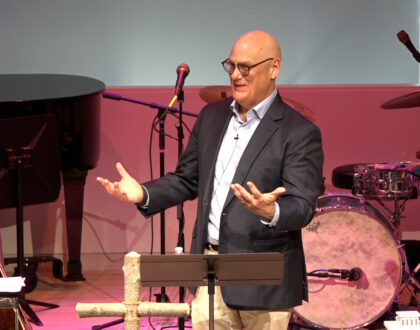Self-reflection at year’s end

The end of a year is a reminder that time moves forward and presses on whether we are ready or not. Change is the only constant. Christmas has come and gone. Trees and decorations are coming down. Everything is on sale.
Somebody once told the story of a department store return desk the day after Christmas. It had a long line with people returning gifts: sweaters, tools, jewelry, toys, and other things they did not want. At the end of the line was somebody holding the baby Jesus, seeking to take him back.
Will the hope, peace, joy, and love of Christmas live on in our hearts or will we pack it away for another year and return to life as usual?
Now is the time to reflect and ask some important questions during this brief time of transition. What lessons did we learn in 2018? What did we accomplish this year? How have we changed?
Many people will jump right ahead to New Year’s goals and resolutions and will miss this important opportunity to reflect upon their lives over the past twelve months. In his letter to the Galatians, Paul identifies what he calls the fruit of the spirit. These are nine virtues that are signs of spiritual depth and maturity: love, joy, peace, patience, kindness, generosity, faithfulness, gentleness, and self-control. It seems true that those who have a strong faith and a healthy spiritual life are constantly working to cultivate these virtues in the way that they live and interact with others. Therefore, our end of year reflection should include questions like these:
LOVE – Did I love others well this year, starting with my own family? Was it evident in my words and actions? Did I love and respect myself?
JOY – Did I experience moments of joy that went beyond simply being happy? Was I able to live in the present?
PEACE – Did I find inner peace in my own heart or did I live with ongoing tension and resentment from the past? Did I seek to make peace among family and friends? Was I able to let certain things go?
PATIENCE – Was I patient with difficult people and in difficult situations, or did anger, frustration, and restlessness take over?
KINDNESS – Was I kind in my words and actions, and did I speak kindly of other people? When others were unkind to me, how did I respond?
GENEROSITY – What percentage of my income did I give away to help others? Where did I volunteer?
FAITHFULNESS – Was I faithful in my spiritual life? Did I cultivate spiritual disciplines to nurture my soul?
GENTLENESS – Was I gentle in sensitive situations? Did I show compassion to those who are hurting?
SELF-CONTROL – Did I manage myself well? Did I eat and drink too much? Did I get enough sleep? Did I choose my words carefully? Was self-care a priority?
Being human is not easy. It is hard. Paul says, “I don’t understand my own actions. I do the very thing that I hate.” Dr. M. Scott Peck begins his classic book The Road Less Traveled” with three simple words: “life is difficult.”
We all have our flaws and shortcomings. Stress affects our attitude and behavior. We also live in a world that often seems out of control, politically, socially, technologically, and even morally. Many days, we are trying to make sense and bring order out of the chaos.
As we look ahead to 2019, perhaps our goals and priorities should go beyond simply dieting and losing weight (both important). May we strive to do the challenging reflection and inner work that develops character and that leads us to a healthier state of heart and mind.
Recommended Posts

Authenticity in a Social Media World
April 16, 2024

“Leveraging Our Love” – Jay Hutchens – April 14, 2024
April 14, 2024

Living with Gratitude & Generosity
April 11, 2024

